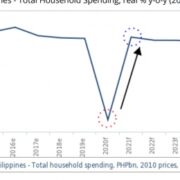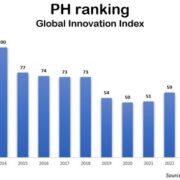
For the Philippines, a ‘V-shape’ recovery in consumer spending by 2021 has been forecast by a unit of Fitch Group.
In its report released last Friday, October 30, Fitch Solutions projected that the Philippines’ household spending for 2021 will increase by 5.7% from this year’s contraction of 8%.
The report added that the household spending growth forecast for 2021 improved from the 5.5% year-on-year projection it estimated from a pre-pandemic climate for last year.
“We predict that all of the main consumer spending categories will return to positive growth in 2021. Food and non-alcoholic drink spending were prioritized in household budgets in 2020, and so growth in spending on these items, while remaining positive, will be slightly lower in 2021,” Fitch Solutions said.
Due to the impact of the coronavirus disease 2019 (Covid-19), Fitch Solutions revised its growth projection for the consumer spending category:
-Food and non-alcoholic drinks category is projected to increase by 9.3% this year from Fitch Solution’s pre-Covid projection of 8.4%;
-Clothing and footwear spending is projected to contract by 15.6% from a pre-Covid growth forecast of 7.2%;
-Alcohol drinks and tobacco spending revised to -16.7% from the initial forecast of 7.8%;
-Furnishing and home spending to -15.2% from the 7.8% growth forecast;
-Recreation and culture spending now expected to decline by 17.8% from 1.1% contraction; and
-Restaurants and hotels spending down by 16.8% from pre-Covid growth forecast of 9.3%.
For 2021, all these industries are expected to increase between 5.3% and 15.3%.
 The decrease in unemployment will aid household spending is noted by Fitch Solutions.
The decrease in unemployment will aid household spending is noted by Fitch Solutions.
Government data indicates that the unemployment rate jumped to 17.7% amid the Covid-19 outbreak in the Philippines and at the peak of the lockdown measures in April. It slowed down to 10% in July when the government gradually eased community quarantine measures across the country.
Further, the remaining restrictions on movement, curfew, and intercity and interstate travel are influencing Filipinos’ consumer spending.
“Continued restrictions on movement will dampen spending outlooks, especially in markets with under-developed e-commerce operations,” the Fitch unit said.
Yet the downside risks to the 2021 projections include renewed restrictions if Covid-19 daily cases continue to rise, delay in vaccine availability, and public backlash to new restrictions.
“Should movement restrictions be re-imposed, then there is a risk of public backlash. This could lead to governments placing greater restrictions on retail and hospitality operations. Protests would also decrease consumers’ desire to shop, travel, or dine out,” Fitch Solutions added.






